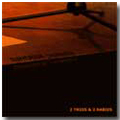| RECORDS | HOME
EUPHORIUM_freakestra: 2 Trios & 2 Babies (EUPH 009)
Matthias Mainz - trp Rundum
eine Spiel- und Lebensfreude
The EUPHORIUM_freakestra live in December 2005. On one exciting
stage in Leipzig, the creative centre of eastern Germany. At
least a home
game for the ever transforming ensemble. This time you can
experience creative improvised music of young and talented
twens, reliable
and distinct musicians in their thirties and one legendary grandmaster.
The project is about some constellations i.e. personal variations
of contemporary chamber jazz. Two drummerless trios meet two
drummers.
Reviews: Von
Nichts kommt Nichts. Die legendäre naTo, schon lange
vor 1989/90 eine der Adressen ‚Drüben‘ für
alternatives, kritisches Denken, Feiern und Tönen und alljährlich
nachtschwärmerisches Ziel der Besucher der Leipziger Jazztage,
war auch der Durchlauferhitzer für Oliver Schwerdts Vordringen
in die weißen Flecken der Jazzlandschaft. Seit 1999, damals
gerade mal 20, mischt er maßgeblich im EUPHORIUM_freakestra
mit, um das sich eine virulente E_f-Szene herausbildete. 2 Trios & 2
Babies (EUPH 009) fängt Klangereignisse ein, die sich am 16.12.2005
in Leipzigs kultigem Auditorium für jazzeuphorisches Stegreifspiel
abspielten. Zwei E_f-Keimzellen, das GSN_Trio mit Schwerdt, Fabian
Niermann am Tenorsax und Konrad Grüneberg am Bass bzw. das
ungewöhnlich besetzte M_Trio mit dem Trompeter Matthias Mainz,
dem Cellisten Matthias Lorenz und dem Bassisten Michael Haves,
ließen sich gelegentlich die kammerjazzigen Kotletten rollen
von Günter ‚Baby‘ Sommer oder Babys Baby Christian
Lillinger. Der bringt als Hyperactive Kid nämlich zur Anwendung,
was er 4 Jahre lang bei Prof. Sommer an der Hochschule für
Musik in Dresden studiert hat. ‚2 Babies‘ zeigt die
beiden im Duett, ‚2 Trios‘ ein vereintes Doppel-Trio,
die 11. Konstellation das komplette E_f-Ensemble, das rundum eine
Spiel- und Lebensfreude ausagiert, neben der sagen wir mal Würzburg,
immerhin auch Standort eines Jazzfestivals, einer Hochschule für
Musik und eines angeblich exzellenten universitären Instituts
für Musikforschung, noch kompletter leichenstarr wirkt als
sonst.
|
